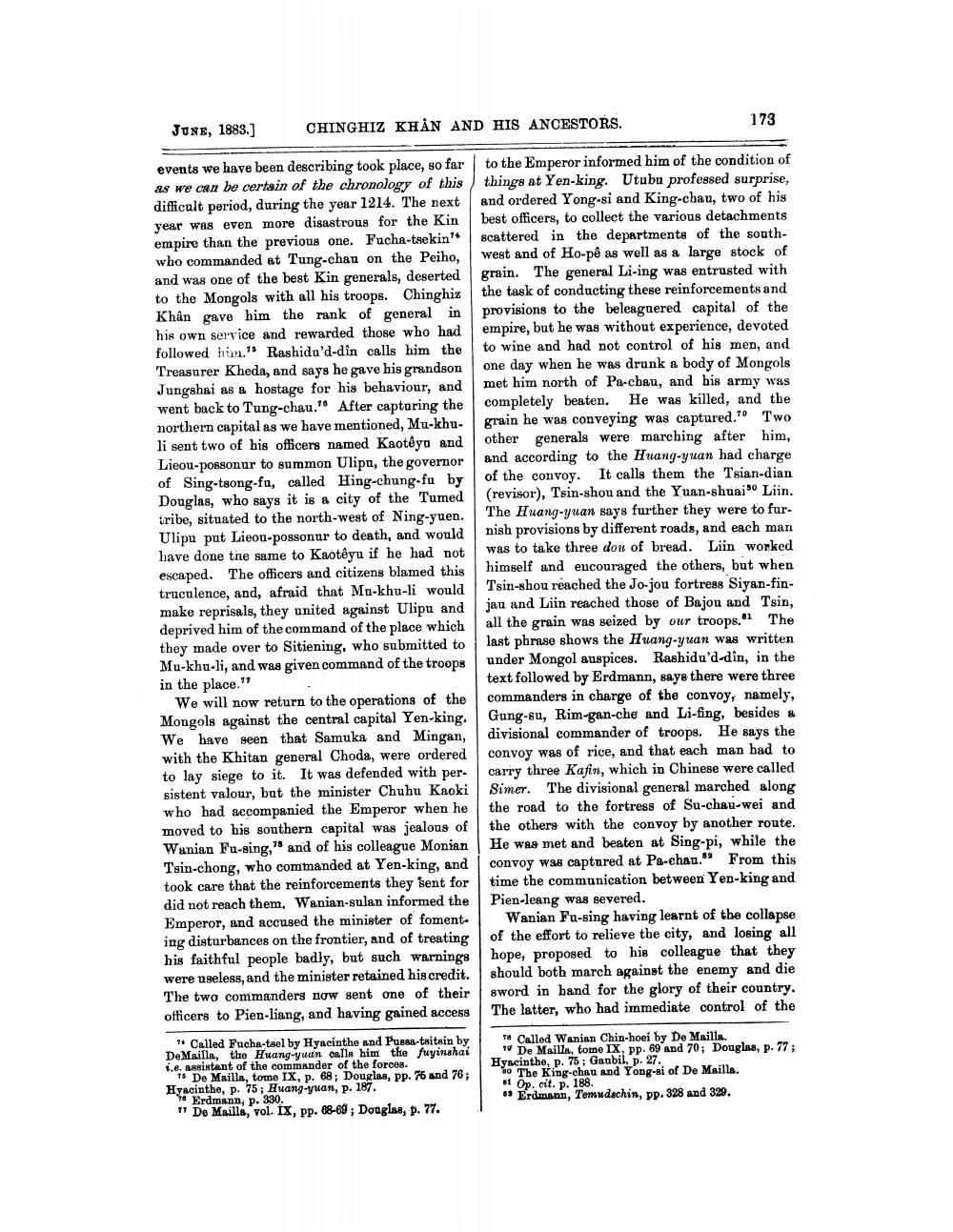________________
JUNE, 1883.)
CHINGHIZ KHÅN AND HIS ANCESTORS.
173
events we have been describing took place, so far as we can be certain of the chronology of this difficult period, during the year 1214. The next year was even more disastrous for the Kin empire than the previous one. Fucha-tsekin" who commanded at Tung-chau on the Peiho, and was one of the best Kin generals, deserted to the Mongols with all his troops. Chinghiz Khân gave him the rank of general in his own service and rewarded those who had followed him." Rashida'd-dîn calls him the Treasurer Kheda, and says he gave his grandson Jungshai as a hostage for his behaviour, and went back to Tung-chau." After capturing the northern capital as we have mentioned, Mu-khu- li sent two of his officers named Kaotêya and Lieou-possonur to summon Ulipa, the governor of Sing-tsong-fa, called Hing-chung-fu by Douglas, who says it is a city of the Tumed tribe, situated to the north-west of Ning-yuen. Ulipu put Lieou-possonur to death, and would have done the same to Kaotêyu if he had not escaped. The officers and citizens blamed this truculence, and, afraid that Mu-khu-li would make reprisals, they united against Ulipu and deprived him of the command of the place which they made over to Sitiening, who submitted to Mu-khu-li, and was given command of the troops in the place."
We will now return to the operations of the Mongols against the central capital Yen-king. We have seen that Samuka and Mingan, with the Khitan general Choda, were ordered to lay siege to it. It was defended with persistent valour, but the minister Chuhu Kaoki who had accompanied the Emperor when he moved to his southern capital was jealous of Wanian Fu-sing," and of his colleague Monian Tsin-chong, who commanded at Yen-king, and took care that the reinforcements they sent for did not reach them. Wanian-sulan informed the Emperor, and accused the minister of foment. ing disturbances on the frontier, and of treating his faithful people badly, but such warnings were useless, and the minister retained his credit. The two commanders now sent one of their officers to Pien-liang, and having gained access
" Called Fucha-tael by Hyacintho and Puasa-teitsin by De Mailla, the Huang-yuan calls him the fuyinshai 1.e. assistant of the commander of the forces.
15 De Mailla, tome IX, p. 68; Douglas, pp. 75 and 76; Hyacinthe, p. 75; Huang-yuan, p. 187.
Erdmann, p. 330. " De Maills, vol. IX, pp. 88-69; Douglas, p. 77.
to the Emperor informed him of the condition of things at Yen-king. Utubu professed surprise, and ordered Yong-si and King-chau, two of his best officers, to collect the various detachments scattered in the departments of the southwest and of Ho-pê as well as a large stock of grain. The general Li-ing was entrusted with the task of conducting these reinforcements and provisions to the beleaguered capital of the empire, but he was without experience, devoted to wine and had not control of his men, and one day when he was drunk a body of Mongols met him north of Pa-chau, and his army was completely beaten. He was killed, and the grain he was conveying was captured. Two other generals were marching after him, and according to the Huang-yuan had charge of the convoy. It calls them the Tsian-dian (revisor), Tsin-shou and the Yuan-shuai" Liin. The Huang-yuan says further they were to furnish provisions by different roads, and each man was to take three dow of bread. Liin worked himself and encouraged the others, but when Tsin-shou reached the Jo-jou fortress Siyan-finjau and Liin reached those of Bajou and Tsin, all the grain was seized by our troops." The last phrase shows the Huang-yuan was written under Mongol auspices. Rashidu'd-din, in the text followed by Erdmann, says there were three commanders in charge of the convoy, namely, Gung-su, Rim-gan-che and Li-fing, besides a divisional commander of troops. He says the convoy was of rice, and that each man had to carry three Kafin, which in Chinese were called Simer. The divisional general marched along the road to the fortress of Su-chau-wei and the others with the convoy by another route. He was met and beaten at Sing-pi, while the convoy was captured at Pa-chan." From this time the communication between Yen-king and Pien-leang was severed.
Wanian Fu-sing having learnt of the collapse of the effort to relieve the city, and losing all hope, proposed to his colleague that they should both march against the enemy and die sword in hand for the glory of their country. The latter, who had immediate control of the
Called Wanian Chin-hoei by De Mailla.
De Mailla, tome IX, pp. 69 and 70; Douglas, p. 77; Hyacinthe, p. 75; Ganbil, p. 27. 10 The King-cheu and Yong-si of De Mailla. 1 Op. cit. p. 188. " Erdmann, Temudochin, pp. 328 and 329.
Called Wanian Chin
HyacinthMaille, tome IX. Ander of the forcohe fuyinshai




